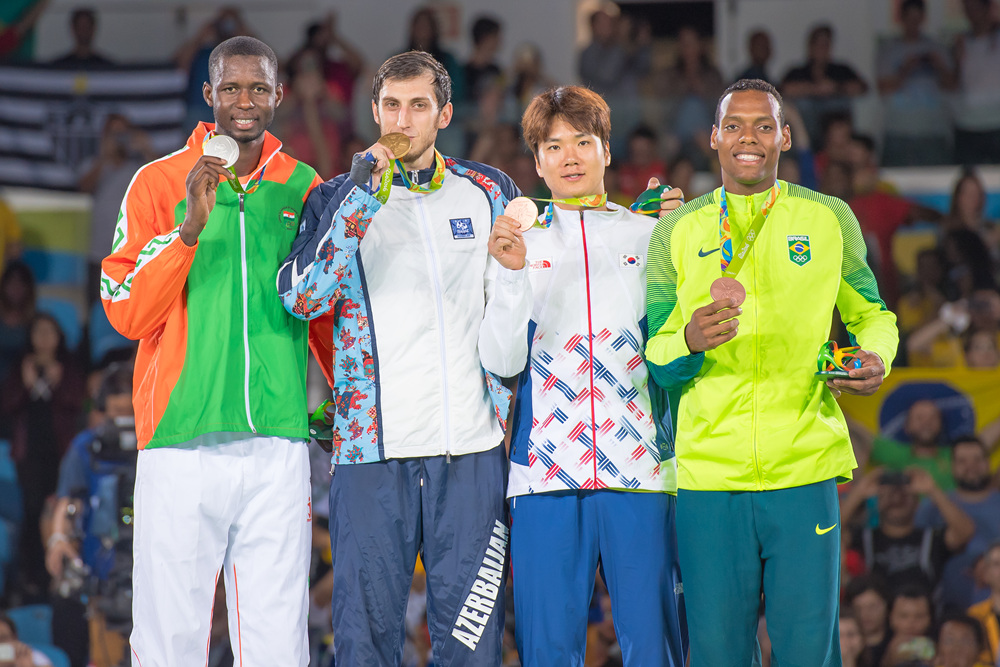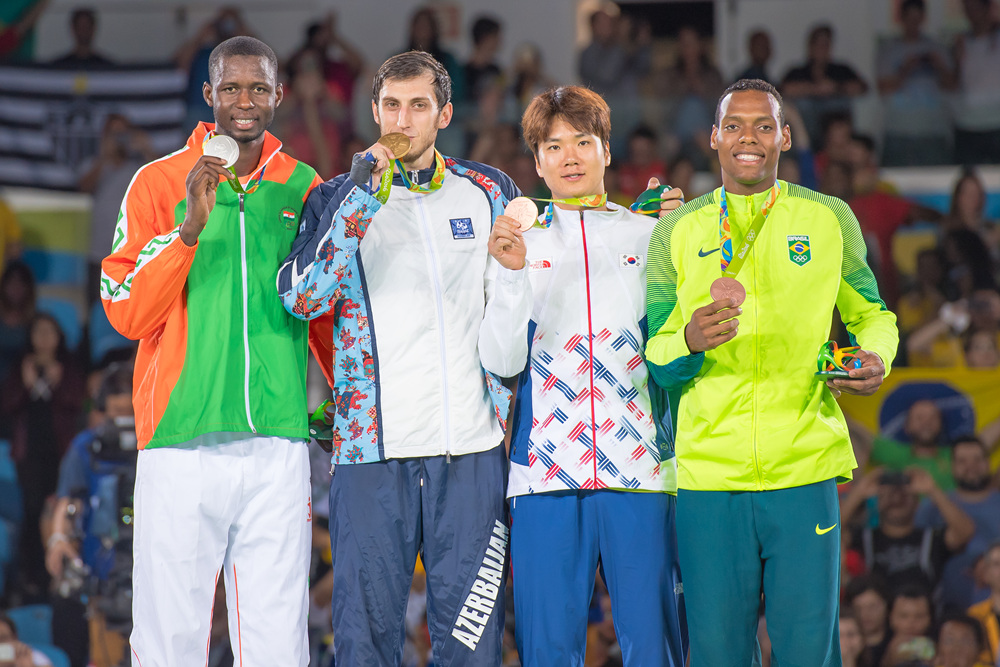RIO DE JANEIRO, Brazil (Aug. 20, 2016) – The fourth and final day of the Olympic taekwondo competition at Carioca Arena 3 in Rio’s Barra Olympic Park saw the male and female heavyweight categories being contested, with golds going to China and Azerbaijan.
In the women +67kg category, gold went to Shuyin Zheng of China and silver to Maria Del Rosario Espinoza of Mexico, while bronzes were won by Bianca Walkden of Team GB and Jackie Galloway of Team USA. In the men +80kg category, gold was seized by Radik Isaev of Azerbaijan, silver went to Abdoulrazak Issoufou Alfaga of Niger, and Brazil’s Maicon Siqueira and South Korea’s Dong-min Cha took home the bronzes.
With today’s results in, the end result of the overall taekwondo competition at Rio 2016 was: South Korea in first place with two golds and three bronzes (a remarkable result, with every athlete on the team medaling); China in second place with two golds; and Great Britain in third place, with one gold, one silver and one bronze.
Women +67 kg Category
The final saw China’s number-two seed, Shuyin Zheng, face off against Mexico’s number-one seed, Maria Del Rosario Espinoza. This would be a battle both of style and physique: The Chinese is more than a head taller than the Mexican, and fights from the center of the mats, flicking out her long legs. The Mexican, on the other hand – the Beijing 2008 Olympic gold medalist - is a fiery competitor, armed with an arsenal of round kicks and close-in spin back kicks and punches. Would Espinoza be able to close the gap, get inside the arc of Zheng’s legs, and land her weapons on target? Or would Zheng keep Espinoza at a distance and pick her off from long range?
Round 1 started with Espinoza circling and trying to feint out Zheng, with the crowd clearly favoring the Mexican. Espinoza darted in for a kick – and the Chinese extended her leg and scored, putting her one up at the end of the first. In the second, this pattern persisted, with Espinoza circling but being unable to cut into Zheng’s perimeter, shut down her legs, close and score. It ended 1-0. In the third, Espinoza finally got in and punched – no score - and Zheng clinched. With the tempo rising, the Chinese raised her score to three, then to four, then to five points. In the last two seconds, Espinoza scored one point – but it ended 5-1 and gold for Zheng. She leapt up and down with excitement then ran a lap of honor trailing the Chinese flag.
“I was not nervous,” she said in the post-match interview. “It was more nerve-wracking watching my team mates fighting on previous days.” In a remarkable double act, Zheng’s equally tall and leggy boyfriend Shuai Zhao had won gold on Day 1.” We never fight!” she confided.
In the first repechage, ninth-seeded Wiam Dislam of Morocco defeated 16th seed Kirstie Elaine Alora of the Philippines by 7-5. In the second repechage, France’s seventh-seeded Gwladys Epangue eliminated Nepal’s 15th seed Nisha Rawal, 4-3. It had been a brave achievement for Rawal - who won a wild card to Rio - to do so well: Epangue’s Olympic ranking is eighth, Rawal’s is 289th.
The first bronze-medal match pitted Dislam against Great Britain’s third-seeded Bianca “Queen Bee” Walkden. Round 1 ended scoreless, with the Moroccan looking the livelier. However, in the second, it was Walkden who lit up the board with a round kick to the body – scoreless – that she then pulled up, without placing her foot on the ground, to a round kick to the head for three points. This was crafty, skillful play. She followed that with a torso kick for 4-0. Coming out in the third, Dislam started fast and aggressive, pressuring the Liverpudlian lass back to the edge of the mats – but Walkden fired back and scored with a crescent kick to the head, going up 7-0. Dislam salvaged honor with one point, but it was the “Queen Bee” who captured bronze, 7-1.
The second bronze match saw Epangue take on Team USA’s fourth-seeded Jackie Galloway. The French fighter has the more imposing physique, the American a light, livelier style. Round 1 started fast, with Epangue daring Galloway to close. Galloway obliged – and scored, 1-0. In the second, Epangue, holding center court, continued to goad her opponent to bring it on; the American, wisely, danced around the perimeter, looking for an opportunity. In the third, Galloway added another point as the crowd chanted “Allez, Gwladys.” In the match’s first close-range flurry, Epangue scored her first point. With ten seconds left on the clock, Epangue went on the charge, but to no avail: In ended 2-1 and Olympic bronze for the nifty American.
Men +80kg Category
The final saw Azerbaijan’s third seed, Radik Isaev, going into battle against Niger’s Abdoulrazak Issoufou Alfaga, the 12th seed. Both these fighters are long, tall and leggy - albeit the African has a slight height advantage. Round 1 started with both men aiming long-range, probing sidekicks at one another and neither using much footwork. Round 2 continued the same way, punctuated with some scrappy clinching. Issoufou Alfaga appeared to be kicking with more venom, but it was the Azeri who scored first with a head shot for three points – awarded after a video replay. In the third, Isaev landed a second crescent kick to his opponent’s head, raising his score to six. The athlete from Niger managed to claw back one point and in the last 20 seconds, went over to the attack, but his assault was countered by Isaev going to the clinch. The match ended 6-2, Isaev, to muted crowd reaction.
“I am still on a cloud, I can’t believe I am Olympic champion!” Isaev said after the dust settled. Asked if he was satisfied with his performance, he said, “I did what my coach told me to do – and I won!”
In the first repechage, fourth-seed Maicon Siqueira of Brazil took out fifth-seed M Bar N Diaye of France, 5-2 to the delight of a partisan and very, very noisy crowd. In the second repechage, South Korea’s sixth-seeded Dong-min Cha, the Beijing 2008 gold medalist, routed Kazakhstan’s 14th seeded Ruslan Zhaparov, 15-8.
The first bronze medal match saw Siqueira go into combat against Great Britain’s 10th seed Mahama Cho. With a Brazilian in a medal match, the crowd were in thunder mode, stamping and roaring “Bra-zil! Bra-zil Bra-zil!” Both men are of a similar build and stature and proved well matched in action: Neither scored in the first. In the second, both dueled with sidekicks from side-on stances. Then, Cho landed an arcing, from-nowhere crescent kick to the head but fell, taking the board to 3-1.There were fierce clashes as the Brazilian tried to drive the Briton off the mats - but no score. The third would be the decider. Siqueira had to go for broke. In a furious flurry, he landed a head kick, going 4-3 up. Cho equalized 4-4 with 50 seconds left, then the Brazilian scored another, 5-4. With seconds to go. Cho launched a last-chance charge, but it ended 6-4 to the hometown boy. Cho looked heartbroken; Siqueira leapt into the stands and was submerged in an ecstatic audience. It had been a bronze medal battle worthy of gold.
The second bronze medal match saw Cha take on Uzbekistan’s imposing number-one seed, Dmitriy “Shock Force” Shokin. The fight stared with long-range probing kicks and evasive body moves by both fighters as they sought to find the distance. Round 1 ended with the scoreboard empty. In the second, both men scored on the edge of the mats, tying at 1-1, then 2-2, before Cha again took the lead, 3-2. In the third, the Uzbek battleship had to attack decisively. His punch took the score to 3-3 with less than a minute on the clock, then Shokin drove Cha to the floor with a round- kick punch combo - but no score. The Uzbek’s final attacks looked and sounded to have landed – the “thwack” of his kicks were clearly audible even from Carioca 3’s higher stands – but did not register on the PSS. So, Olympic bronze would be decided by golden point. A flying attack from Cha was countered by round kicks and punches from Shokin then – suddenly! – it was over: Cha had lit up the board. A disaster for the highly favored Shokin, who leaves Brazil empty-handed, but an incredible career end for the veteran Korean, who has announced that Rio will be his last competition.
The taekwondo competition in Rio consisted of 128 athletes in eight male and eight female categories, originally of 16 players, representing 63 NOCs.
To see more photo, click here


